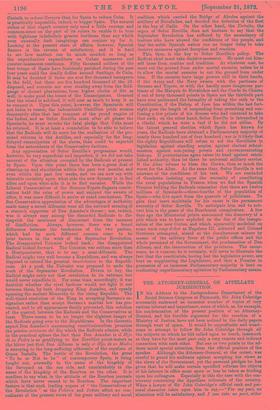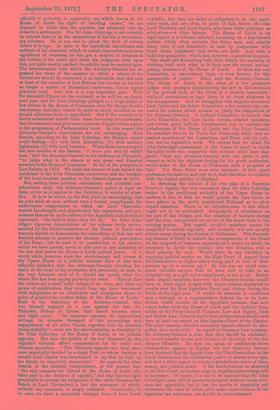THE ATTORNEY-GENERAL ON APPELLATE JURISDICTION.
IN his Address to the Jurisprudence Department of the 1 Social Science Congress at Plymouth, Sir John Coleridge necessarily embraced an immense number of topics of very various interest and importance, some of which, as, for example, his condemnation of the present position of an Attorney- General, and his forcible argument for the creation of a Ministry of Justice, have not been noticed in the daily papers through want of space. It would be unprofitable and weari- some to attempt to follow Sir John Coleridge through all the subjects on which he felt called upon to touch, inasmuch as they have for the most part only a very remote and indirect connection with each other. But one or two points in the ad- dress merit special attention, from the official position of the speaker. Although the Attorney-General, at the outset, was careful to guard his audience against accepting his views as the views of the Government, yet the personal pledges he has given that he will make certain specified reforms the objects of his labours in office must more or less be taken as binding upon his colleagues. Especially is this the case with the con- troversy concerning the Appellate tribunals of the country. When a lawyer of Sir John Coleridge's official rank and per- sonal character takes upon him to say,—" For my part, no alteration will be satisfactory, and I can take no part, either officially or privately, in supporting any which leaves to the House of Lords the right of deciding causes," we are disposed to think that the question has advanced very far towards a settlement. For Sir John Coleridge is not certainly by natural bent or by the associations of his life a revolution- ary reformer. He is not one to pluck the fruit of reform before it is ripe. In spite of the superficial smoothness and softness of his character, which to casual observation may seem significant of weakness, he has got a stratum of firmness at the bottom of his mind, and when his judgment rests upon this, not quite readily reached, its solidity may be counted upon. The determination with which the Attorney-General has ex- pressed his views of the manner in which a reform of the Judicature should be conducted is an indication that this part at least of the question of Law Reform has become in his view no longer a matter of theoretical controversy, but an urgent practical need. And this is a very important gain. With Sir Roundell Palmer on the woolsack, as he will be, no doubt, next year, and Sir John Coleridge pledged to a large policy of law reform in the House of Commons, even Sir George Jessel's reactionary obstinacy cannot do quite so much mischief as we should otherwise have to apprehend. But if the country is to derive substantial benefit from these favouring circumstances, the Government must give some measures of legal reform a place in the programme of Parliamentary work. In this respect the Attorney-General's observations are not encouraging. Next Session, according to Sir John Coleridge, the Ministry cannot avoid dealing,—(1) with Irish Education, (2) with sanitary legislation, (3) with local taxation. When these have occupied the best months of the Session, " I leave you and all candid men," said the Attorney-General to his audience at Plymouth, "to judge what is the chance of any great and disputed measure in the House of Commons." So far of the prospects of Law Reform in 1873. We shall not venture to look beyond the quicksand of the Irish Education controversy and the breakers of the local-taxation question to the distant chances of 1874.
But, setting these political calculations and practical con- siderations aside, the Attorney-General's policy of legal re- form, so far as it applies to the Judiciary, is worthy of atten- tion. It is to be noted, in the first place, as encouraging, that he puts aside at once, without even a formal compliment, the unfortunate compromises on which the Lord Chancellor wasted his strength and shipwrecked his reputation and pro- nounces that as far as the reform of the Appellate Jurisdiction is concerned, "the field is fairly clear for us." Sir John Cole- ridge's vigorous denunciation of the scheme lately recom- mended by the Select Committee of the House of Lords was scarcely needed to demonstrate the absurdities of that last and feeblest attempt to preserve the obsolete judicial prerogative of the Peers ; but he used it in justification of his resolve, which we have quoted, never to take part in any alteration of the law that leaves the House of Lords judicial power. It is worth while, however, since the shortcomings and abuses of the UpperHouse as a judicial tribunal have of late been officially deftinded, that the Attorney-General, standing for- mally at the head of his profession, and personally, at least, in the very foremost rank of it., should say openly what the whole Bar has been saying privately for years. "Except that the suitors are a small body, belong to no class, and have no power of combination, they would long ago have denounced with indignation as an intolerable and outrageous abuse in point of practice the endless delays of the House of Lords." Such is the testimony of the Attorney-General, who was himself engaged in a case against the late Dr. Philpotts, Bishop of Exeter, that lasted between seven and eight years. " Its immense expense, its intermittent sittings, its extreme disregard of the proceedings and engagements of all other Courts, together with its absolute irresponsibility"—such are the characteristics, as described by Sir John Coleridge, of the House of Lords, in its judicial capacity. Nor does the quality of the law dispensed by this dignified tribunal afford compensation for its costly and dilatory procedure. " The Chancery appeals not long since were practically decided by a single Peer, at whose decision a caustic Lord Justice was accustomed to say that he held up his hands in respectful amazement." As regards the other branch of the national jurisprudence, at the present time "the only common-law lawyer in the House of Lords who takes part in the decision of appeals," and who has the right practically to reverse the judgments of the whole Common-law Bench, is Lord Chelmsford, a fact the statement of which, without any comment, is amply sufficient. Occasionally, to be sure, we have a somewhat stronger force of Law Lords
available, but they are under no obligation to do this parti- cular work, and are often, in point of fact, drawn off—like Lord Westbury and Lord Cairns, who have taken positions as arbitrators—to other labours. The House of Lords in its legal aspect is a tribunal selected, according to a hap-hazard system, which often excludes the fittest men, and admits many who, if not absolutely, at least by comparison with those whose judgments they revise, are unfit. And with a ludicrous pomposity, which has, however, a practical purpose, " this small and fluctuating body feels keenly the necessity of clothing itself with what is in their case the unreal, but im- posing, character of the House of Lords." Is there any real foundation, in convenience, logic, or even history, for this masquerade of justice ? None, says the Attorney-General. The House of Lords, in the sense of a few pensioner judges with peerages administering the law to the exclusion of the general body of the Peers, is a modern innovation ; while of convenience or logic there is no trace whatever in the arrangement. And to strengthen this singular structure, Lord Cairns and his Select Committee a few months ago con- cocted the scheme which arouses so justly the indignation of the Attorney-General. A Judicial Committee, to include the Lord Chancellor, the Law Lords, certain salaried members, and certain great judicial functionaries, was to combine the jurisdictions of the House of Lords and the Privy Council. Its members were to be Peers, but Peers only while they re- mained members of the Committee, and Peers only for judi- cial, not for legislative work. We confess that we share Sir John Coleridge's amazement at the frame of mind in which the noble lords who supported this scheme could have ima- gined " that any Attorney-General, with one grain of self- respect or with the slightest feeling for his great profession, would make to the House of Commons such a proposal as this." Yet these Peers were once members of that great profession themselves, and owe to it their elevation to equality with the landed nobility of England.
In sketching the outline of his own plan of a Supreme Court of Appeal, the only concession that Sir John Coleridge makes to the traditional authority of the Upper House in matters of law, is that he would permit the Law Lords to have places in the newly constituted Tribunal as ex-officio unpaid members. There is an objection even to this which ought not to be overlooked. Irregularity of attendance on the part of the Judges, and the cessation of business during half the year, are pointed out as two of the worst blots in the existing system. But unpaid ex-officio members cannot be compelled to attend regularly, and certainly will not usually attend except during the Session of Parliament. This fluctuat- ing element is likely to disturb the arrangements of the Court for the despatch of business, especially as it would, no doubt, be necessary to divide the tribunal into two divisions, with a fixed quorum for each. Would there be any hardship in requiring judicial service on the High Court of Appeal from Ex-Chancellors—a higher salary being paid in lieu of their pension up to a certain age ? In this way we could com- mand valuable service, that we have now to take in an irregular way as a gift and a compliment, or not at all. Beside these unpaid members, however, the Attorney-General would have at least eight Judges with ample salaries appointed to preside over the New Appellate Court, and sitting during the whole of the legal year. It would be essential to constitute such a tribunal in a representative fashion, for as its juris- diction would include all the Appellate business that now comes before both the House of Lords and the Judicial Com- mittee of the Privy Council, Common Law and Equity, Irish and Scotch Law, Colonial and Indian jurisprudence should each have at least one expert on this Supreme Court of the Empire. The point remains whether secondary appeals should be alto- gether done away with. In regard to Common-Law business, the Attorney-General is clear that they should be abolished ; he would transfer to the new tribunal all the work of the Ex- chequer Chamber. He does not speak so confidently about intermediate appeals in Equity, but few Chancery lawyers have doubted that the Appeal from the Vice-Chancellors to the Lords Justices met the substantial justice of almost every case, and that a third appeal is merely a mischievous waste of time, money, and judicial power. If the Lords Justices be absorbed in the New Court, no further stage in Appellate proceedings will be necessary. Of course, it is not to be expected that Sir John Coleridge's plan will be generally accepted without much criti- cism and opposition, but it has the merits of simplicity and directness, the value of which, after some recent failures of too ingenious law reformers, can hardly be over-estimated.



































 Previous page
Previous page